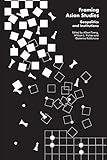Framing Asian Studies : Geopolitics and Institutions / ed. by Albert Tzeng, William L. Richter, Ekaterina Koldunova.
Material type: TextPublisher: Singapore : ISEAS Publishing, [2018]Copyright date: ©2018Description: 1 online resource (289 p.)Content type:
TextPublisher: Singapore : ISEAS Publishing, [2018]Copyright date: ©2018Description: 1 online resource (289 p.)Content type: - 9789814786300
- 9789814786317
- A950.07
- DS32.8 .C62 2013
- DS32.8 .C62 2013
- online - DeGruyter
- Issued also in print.
| Item type | Current library | Call number | URL | Status | Notes | Barcode | |
|---|---|---|---|---|---|---|---|
 eBook
eBook
|
Biblioteca "Angelicum" Pont. Univ. S.Tommaso d'Aquino Nuvola online | online - DeGruyter (Browse shelf(Opens below)) | Online access | Not for loan (Accesso limitato) | Accesso per gli utenti autorizzati / Access for authorized users | (dgr)9789814786317 |
Frontmatter -- Contents -- Foreword -- The Contributors -- 1. Introduction: Framing Asian Studies -- Part I. Contested "Asia" -- 2. From Oriental Studies to Asian Studies: The Metamorphosis of the Western Mind -- 3. Geopolitical and Social Framings of Australia's "Asia Literacy" -- 4. Maps as Illustrations and Logos: Geopolitical Construction of Asia and South Asia -- Part II. Geopolitical Framing of Western Discourse -- 5. From Geertz to Ricklefs: The Changing Discourse on Javanese Religion and its Wider Contexts -- 6. Framing Cambodian Affairs: French and American Scholarship, Media and Geopolitics -- 7. Studying Taiwan: The Politics of Area Studies in the United States and Europe -- Part III. Asian Studies in Former Soviet States -- 8. Southeast Asian Studies in Russia: Agents against Structural Limits -- 9. India Studies in Soviet Lithuania: Approaching Asia from Outside the Establishment -- Part IV. Inter-Asian Gazes -- 10. Indian Understandings of Asia -- 11. South Seas Chinese in Colonial Classifications -- 12. Chinese Studies in Japan and South Korea: Geopolitics, Local Embeddedness and Knowledge -- Index
restricted access online access with authorization star
http://purl.org/coar/access_right/c_16ec
This book explores the interconnection between geopolitical context and the ways this context frames our knowledge about Asia, highlighting previously neglected cause-effect relations. It also examines how various knowledge institutions promote and shape Asian Studies. The authors seek to explain why Asian Studies and its subfields developed in the way they did, and what the implications of these transformations might be on intellectual and political understandings of Asia. The book not only builds on the current debates on the decolonization and de-imperialization of knowledge about Asia; it also proposes a more multifaceted view rather than just examining the impact of the West on the framing of Asian Studies. "This timely and valuable collection is the best analytical and substantive guide we have to the great diversity of changing geopolitical contexts which have shaped the modern production of knowledge about Asia, before, during, and after the Cold War, on both sides of the Atlantic, and also in Australia, Russia, Lithuania, India, Japan, Korea, and Southeast Asia." -David Ludden Professor and Chair, Department of History, New York University "This book is an important addition to the growing number of works on Asian and Southeast Asian studies that seek to take stock of how area studies concerning the region have been developing and what its trajectory is. This book takes a critical view of these developments by going beyond the geopolitical backdrop, contextualising Asian studies in terms of its colonial and Orientalist roots, and bringing attention to the critical reactions to these problems of knowledge production. The book is unique in that it not only looks at Asian studies in the West, but also examines the field in the former Soviet Union as well as within the Asian centres of research." -Syed Farid Alatas Professor, Department of Sociology Faculty of Arts & Social Sciences, National University of Singapore "Asia, a combination of geo-cultural sites without obvious borders of any kind, is un-learned and re-learned in this timely book via an array of Anglo-Euro-Asian scholarship on knowledge. Anyone determined to move beyond pedagogical categories must engage with this transnational project." -Chih-yu Shih Professor, National Taiwan University
Issued also in print.
Mode of access: Internet via World Wide Web.
In English.
Description based on online resource; title from PDF title page (publisher's Web site, viewed 30. Aug 2021)


